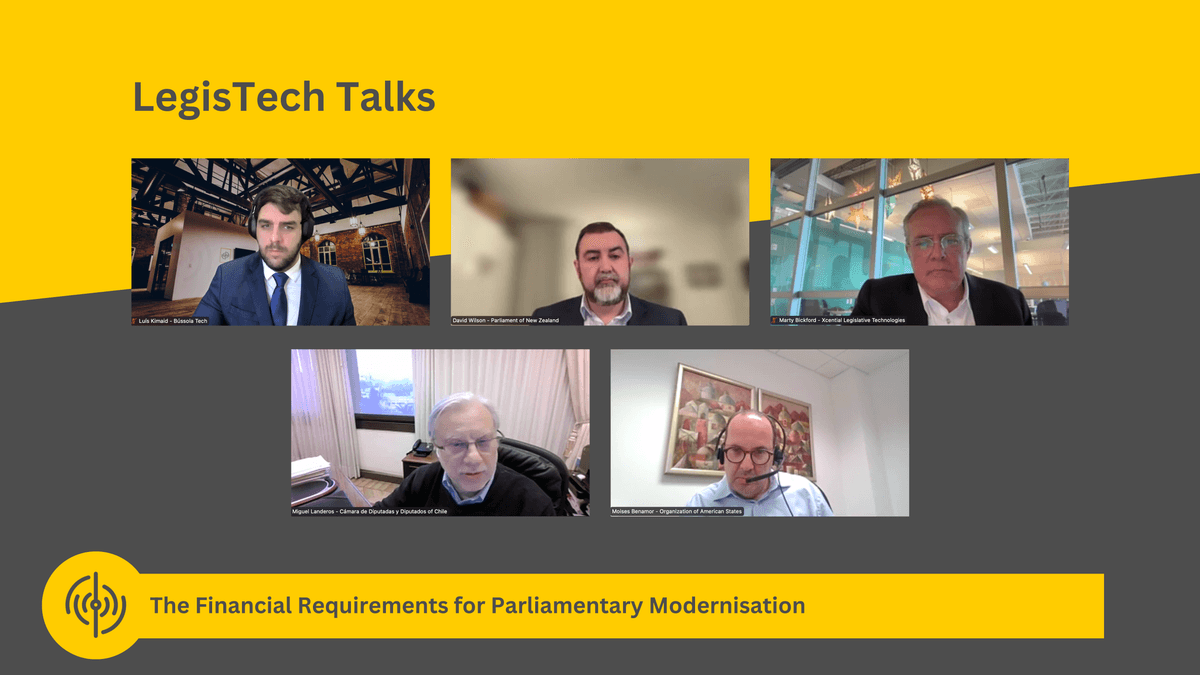
Panel Discussion about The Financial Requirements for Parliamentary Modernisation
How it was

On July 31st, 2025, Bússola Tech hosted a high-level panel discussion titled “The Financial Requirements for Parliamentary Modernisation.” The event gathered senior parliamentary leaders to explore the budgetary, political, and institutional challenges of financing modernization in Parliaments.
Moderated by Mr. Luís Kimaid, Executive Director of Bússola Tech, the panel welcomed Dr. David Wilson, Clerk of the House of Representatives of New Zealand; Mr. Marty Bickford, Vice President at Xcential Legislative Technologies; Mr. Miguel Landeros, Secretary-General of the Cámara de Diputadas y Diputados of Chile; and Mr. Moisés Benamor, Chief of Representative Institutions at the Organization of American States.
The session opened with reflections on the initial considerations parliaments must address when allocating funds for modernization. Dr. Wilson emphasized affordability and the importance of financial independence for legislatures to avoid dependency on executive priorities, while also highlighting New Zealand’s progress toward budgetary autonomy. Mr. Landeros described Chile’s long-term investment planning, including innovative approaches such as token-based valuation of digital services, and underlined the need for parliamentary commissions to validate and sustain modernization programs. Mr. Bickford stressed that modernization is not an event but a continuous cultural process, advocating for short-term, iterative projects that deliver measurable value and protect budget continuity. Mr. Benamor pointed to the lack of planning culture in many legislatures across the Americas, noting that budget under-execution remains a chronic obstacle to modernization.
The panel also examined the political challenges of securing approval for modernization budgets. Speakers highlighted the difficulty of convincing members of parliament to invest in projects that often extend beyond electoral cycles, and the need to frame modernization initiatives in ways that resonate with both legislators’ mandates and citizens’ expectations. Strategies included linking projects to tangible benefits such as transparency, accessibility, and efficiency in service delivery.
A key focus was the balance between risk and responsibility in engaging innovative companies and solutions. Mr. Bickford and Mr. Landeros emphasized the importance of building flexible, standards-based systems that allow for modular upgrades and reduce long-term risks. The discussion underscored that transparency, user engagement, and continuous measurement are essential to avoid failure and ensure financial accountability.
Finally, participants debated whether modernization investments should prioritize short-term, modular initiatives or long-term institutional reforms. While acknowledging the challenges posed by frequent leadership changes, panelists agreed that combining incremental steps with a broader strategic vision offers the best path forward, ensuring continuity and resilience while delivering visible results.
Concluding the session, each panelist underscored that financial planning for parliamentary modernization is not merely a technical exercise, but a political and institutional commitment. The discussion highlighted that securing adequate and sustainable funding, fostering political will, and embedding modernization into long-term institutional culture are critical steps for parliaments to remain effective, transparent, and responsive in the digital era.
Strategic Partners

Privacy Policy



